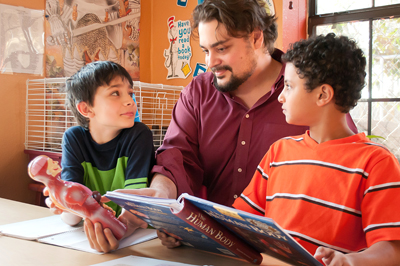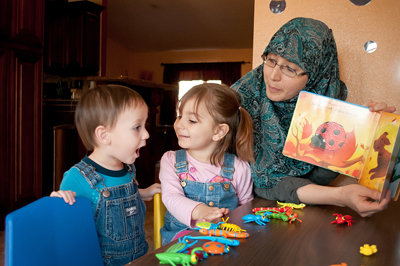
Finished already?” the teacher asked.
“Yes, ma’am,” the first-grader replied, placing her pencil in the holder. “What should I do now?”
This wasn’t the first—or second—time the teacher had noticed this particular student was easily completing her tasks well before her classmates. But letting this one little girl skip ahead to the next lesson would mean the rest of the class would still need to catch up.
“I’ll bring you some paper,” said the teacher. “Why don’t you just draw at your desk until the rest of the children finish, OK?”
And so 6-year-old Danielle spent a good deal of first grade drawing pictures, waiting for the other students to finish each section of lesson work before the teacher could move on. That is, until her parents decided that a homeschooling program would allow their daughter to learn at her own pace.
Today, that eager-to-learn student is a 20-year-old who will graduate college as a dual biology and math major and will enter medical school in the fall.
“We tried public and private schools, ‘gifted’ programs and parochial schools, but none of them worked for one reason or another. The high cost of tuition at a private school would have been worth it if things were wonderful, but they weren’t,” recalls Danielle’s mother, Elise LaTorre. “Our kids were not being challenged; they were bored. The interest and motivation was being snuffed out of them.”

Why Homeschool?
The LaTorre family’s experience is one of the reasons that parents choose to homeschool, but it’s hardly the only one.
“We decided to homeschool because we adopted our children when they were older and found that with them in school and gone 30 hours a week, we had no time to really become a family,” says Joanne Greco-Akerman of Ocala, who runs ocalahomeschooling.com and has been homeschooling since 2004.
“I thought we’d homeschool for a year or two to bond with our kids and really get to know them, but the benefits exceeded what I expected. I ask them every year if they want to go back to school, but they say, ‘Why?’ They don’t want to go back into that box.”
In the past, the decision to homeschool was often motivated by faith and values. Parents didn’t agree with everything their children were being taught in public school and felt certain issues conflicted with the values they wanted to instill.
“We used to hear this over and over, but (conflict of values) is no longer the primary reason for homeschooling,” says Trish Oliva, executive director of Florida Parent-Educator Association (FPEA), a Melbourne-based organization created specifically to help homeschooling families in Florida.
Oliva, who has homeschooled her own children for 17 years, said there are now several main reasons parents opt for homeschooling, including providing a better overall education, safety, bullying issues and special needs children.
“Anytime there’s a national school violence incident, we see a national upsurge in inquiries about homeschooling because of safety,” she adds, referencing the tragic Sandy Hook Elementary School shooting in December 2012.
“I’ve seen many kids pulled out of public schools because behavior issues become a wake-up call for both student and parent and turn into great success with homeschooling. Sometimes, taking the child out of school takes the pressure off them, such as with a bullying situation, and they thrive in homeschool,” says Oliva.
“Homeschooling should be a conscious, well-thought-out decision, not a knee-jerk reaction to a bad situation,” she emphasizes. “When it comes to safety or bullying, we make sure parents are truly grasping what’s involved in homeschooling.”
Homeschooling requires time and dedication on the part of parents—much more so than traditional schooling.
“It’s harder for parents to homeschool than to put their kids on the bus and send them to public school,” says LaTorre, the founder of florida-homeschooling.org, who left behind a well-paying executive job in 1999 to homeschool her three children. “But if you’re interested enough in your child to sign up for homeschooling, you’re going to make it work. Most parents are forfeiting an income to do this, so people don’t usually homeschool unless they’ve really thought about it and are committed.”
Homeschooling Allows Flexibility
So what exactly is involved? States have certain basic requirements, of course, but there’s no “set-in-stone” method of satisfying those requirements. Flexibility is one of the most appealing aspects of homeschooling.
For example, Florida law requires that public and private school students must regularly attend school for 180 days of school each year. Those daily or hourly attendance requirements don’t apply to students in a home education program.
Oliva says that homeschooling is all about learning without boundaries.
“You can structure a learning program child by child, year to year, family by family to meet each child’s needs wherever they are in that moment. Homeschooling takes away all the preconceived ideas, fences and boundaries.”
“One of the great things about homeschooling is the freedom,” says Greco-Akerman, who is homeschooling daughters Jacqueline, 14, and Shawna, 17.
“My daughters have freedom their school friends don’t have,” she adds. “The beauty of homeschooling is that your children can pursue things they’re passionate about. My daughters are very active in horseback riding and volunteer two to three days a week at Stirrups and Strides, a therapeutic riding facility. When it comes to sports, our kids belonged to the YMCA for several years where they played soccer, basketball and flag football and really enjoyed it.”
“You always hear good things about schools that have fewer students and more time with the teacher, and that’s what you get with homeschooling,” says LaTorre. “Children get one-on-one attention and the ‘teacher’ (usually Mom), is totally invested in the child’s success. You tailor how to deliver the education according to how the child learns and can create unique lesson plans.”
Another big advantage of home education is that you can create a schedule that works for your family. You aren’t locked into a set time frame.
“You don’t have to homeschool Monday through Friday from 9am to 3pm,” says Oliva. “You can set your own hours that work for your family, say from 1 to 5pm four days a week, or you can go year-round and not take off for the summer to have more flexibility.”
The amount of time required varies, depending on the child’s age. For example, homeschooling a kindergarten student may only require two hours a day, while a fifth-grader will typically put in about four hours daily.
Once a student is at the high school level, he or she is often investing more time in school work than the parent, especially if they’ve been homeschooling from the start.
Parents do need to realize that if they cannot dedicate a minimum of two to four hours a day, their lifestyle probably isn’t conducive to homeschooling. Oliva also adds that if there is an antagonistic relationship between the parent “teacher” and child, homeschooling probably won’t be a success.
“Children are all so different; some learn through books, others through hands-on activities. I can adjust my lessons to match their specific intelligence and personalities,” says Najia Kurdi of Ocala. “They won’t fall through the cracks as they might in public school because they’re forced to conform to a specific mold in a large classroom.”
Kurdi and her husband, Yousef Elyaman, a local doctor, were both homeschooled themselves, so it only seemed natural to choose this option for their children, Adnan, 9, and Muhammad, 8. It will also be the choice for Tasneem, 3, and Musa, 1 and a 1/2.
Kurdi formerly worked in the school system as a sign language interpreter. Although she met some great teachers working in many different schools and classrooms, she wasn’t eager to send her own children into that learning environment.
“A lot of times in school, their curiosity just gets squelched,” Kurdi says. “The flexibility of homeschooling allows me to jump on real-life activities and develop them into learning opportunities that have meaning and will stick with them. Instead of forcing them to read a textbook just because this is what the curriculum says, we allow them to read on topics they’re interested in. Our children love to read; they beg to go to the library and Barnes & Noble. Often, even the books they read for pleasure are non-fiction books about animals or science, so they’re learning.”
Kurdi takes the children to the Discovery Center weekly (“it’s awesome!”), and local events become learning experiences. For example, knowing the Renaissance fair was coming to Gainesville, Kurdi created a whole series of studies around medieval times, including a trip to Medieval Times dinner theater in Orlando.
Staying Within The Law
Under Florida law, “compulsory attendance” applies to all children between the ages of 6 and 16, meaning they must be enrolled in either public school, private school, parochial school, a home education program or a private tutor program. The law also states that children being taught by a parent or guardian must have “sequentially progressive instruction,” which means following some form of curriculum.
“Homeschooling laws vary from state to state. Some states, such as Texas, have no restrictions. Others, New York, for example, have so many restrictions and laws, it’s almost impossible to home school,” Oliva explains. “Florida is considered ‘homeschool friendly’ because the laws are not cumbersome to follow.”
Under Florida statues, parents basically have three choices when it comes to home education and satisfying the state’s compulsory attendance laws. They can:

Register with the county by sending a letter of intent to the county superintendent’s office, maintaining a record of activities and work and filing an annual evaluation.
Enroll with a private non-campus-based “umbrella” school, which facilitates home education and offers curriculum and procedures for parents to follow.
Establish a private tutor program. (This option is not commonly chosen, simply because many families find it cost-prohibitive.)
As of 2010, over 2 million U.S. children (approximately 4 percent of all school-age children) were being homeschooled, according to the National Home Education Research Institute. The last report on Florida home education statistics revealed that approximately 48,000 families (that’s 60,000+ students) are currently homeschooled, as of June 2012. If you add in the families that are homeschooling under an “umbrella school,” this increases the numbers by about 45,000 more families.
“The option that is not talked about enough is that you can enroll with an umbrella school,” says LaTorre.Her site, florida-homeschooling.org, offers a listing of private schools that work with homeschoolers. “These schools will give you a lot of support and guide you with curriculum, which the county won’t do. You wouldn’t go to the IRS for financial advice, so going to the county for homeschooling advice is similar. The county is more like the law enforcer; not there to help you.”
With an umbrella school (sometimes referred to as a “cover school”), a family wishing to homeschool enrolls at this school instead of registering as homeschoolers with their local school district.
One benefit of this method is that the umbrella school generally helps select curriculum, although it’s up to the parents how to use it.
Which brings up a very valid point… how does a parent teach a subject he or she doesn’t understand?
“You don’t have to be good at everything. My daughter, who’s going to medical school, is a math major, and I’m not good at math,” says LaTorre. “My kids did a lot through Florida Virtual School, which is free; it’s your tax dollars at work. (FVS is a public online school providing tuition-free middle and high school courses to Florida students grades six through 12). It’s all online, and you still do it from home. It’s a great option for the parent who doesn’t feel confident teaching certain subjects. This is the method we used as our children got older. Not only did they have teachers through Florida Virtual School, but they also had access to tutors.”
When it comes to a subject the parent isn’t comfortable teaching, LaTorre says homeschoolers sometimes hire a private tutor for a period of time. They may also have someone else teach that particular subject. For example, a parent in your homeschool support group may be an electrical engineer and a whiz at math, so he or she can teach calculus to your child.
“With tough subjects like math and science, you can utilize many different methods,” says Oliva. “If a parent doesn’t feel capable, you can purchase curriculum that has CDs with a teacher teaching, so that teacher is actually doing the lesson and you have the teacher book to follow along. They also have customer service help where you can call and talk to someone if the student gets ‘stuck.’
“When it came to high school science, I didn’t want my children dissecting anything in my kitchen! I found a private school where my son could go take that one class and do labs, but do the rest of the assignments at home. Another option is using a retired teacher for a particular subject or forming a co-op where several families come together for certain classes and have parents who are good at certain subjects teach those classes.”
The Internet has definitely made homeschooling easier. In addition to Florida Virtual School, you can also find plenty of free homeschool material online. Students can use a Kindle, or other e-reader device, to download books. They can “borrow” books from their local library or other online sites without spending a penny… or any gas. You can search online and find numerous sites such as freecycle.org where you can sell or swap curriculum items. You may also have luck contacting local homeschool support groups to see if they offer any used curriculum sales.
Support groups are something parents don’t usually know about until they get into homeschooling, but there are plenty of these groups—here locally and across the country. They can help with field trip opportunities, curriculum items and more.
The Socialization Myth
One of the biggest issues people have with homeschooling is the belief that children aren’t properly socialized.
“Socialization is the most common misconception about homeschooling. It’s the ‘boogie man under the bed,’ but people who think this have never homeschooled,” says LaTorre. “It’s actually the reverse; homeschooled kids are better socialized because they’re not just socializing with kids whose birthdays are the same year as theirs. You don’t have to have a school building to socialize. There are Boy and Girl Scouts, 4-H, volunteer organizations and activities through your community, church and neighborhood.”
“You just have to offer other alternatives for school socialization and make sure your child is around other children,” adds Karen Mulhollem of Ocala, who has been homeschooling her granddaughter Katey Post, 11, since kindergarten.
“Katey is very outgoing and precocious; she loves people, so we decided early on to put her in community classes so she’d have a way to socialize and learn outside the homeschool environment,” says Mulhollem.
“At age 5, we enrolled her in acting classes and Ocala Civic Theatre, and at this point, she’s already appeared in three plays. Two years ago, we enrolled her in the Discovery Center program for hands-on learning activities. Katie has met a lot of friends through the theatre and science center. We’re also looking into other performing arts activities in town.”
Florida Statute 1006.15 requires that homeschooled students be given the same opportunity to participate in “inter-scholastic extracurricular activities” as public school students and prohibits any requirements that would make participation less accessible for homeschooled students.
“Homeschool students are allowed to participate in extracurricular activities, such as sports, band and chorus, at the zoned school they would have attended in their area,” notes Oliva. “Tim Tebow is a great example; this law came about because of him, actually. His success would never have come to fruition if he’d only played with a community football team.”
Oliva says many homeschool families don’t take advantage of this opportunity unless they have students who may get a scholarship because of their skills in a particular sport.
Speaking of scholarships, homeschooled students are still eligible for a Bright Futures Scholarship. Some also take dual enrollment courses on a postsecondary campus.
Graduation
Although homeschooled students in Florida don’t receive a diploma from the state unless they choose to homeschool through a private (“umbrella”) school, there are alternatives.
The parent can award a diploma to the child upon completion of high school studies, or the child can take a General Educational Development (GED) test and will be given a Florida GED diploma with a passing score. A more exciting option is the graduation ceremony conducted each May by the FPEA at their annual homeschool convention.
“During this two-day convention, we have over 130 workshops for parents and a graduation ceremony and activities,” notes Oliva. “The students choose their own caps and gowns, so it’s a sea of colors.
This allows homeschool students to participate in a ceremony, and they get to throw their caps in the air—something that is not allowed at a public school graduation ceremony anymore. We typically have about 250 to 275 students from across Florida who participate each year and many graduate with AA degrees completed. Two years ago, Governor Scott handed out the diplomas.”
“Homeschooling may not work for everybody, but the important thing—whether your child is in public school, private school or homeschool—is for the student to have a love of learning,” says Najia Kurdi. “It’s also important to have involved parents who know what’s best for their children so they can achieve their maximum potential.”






